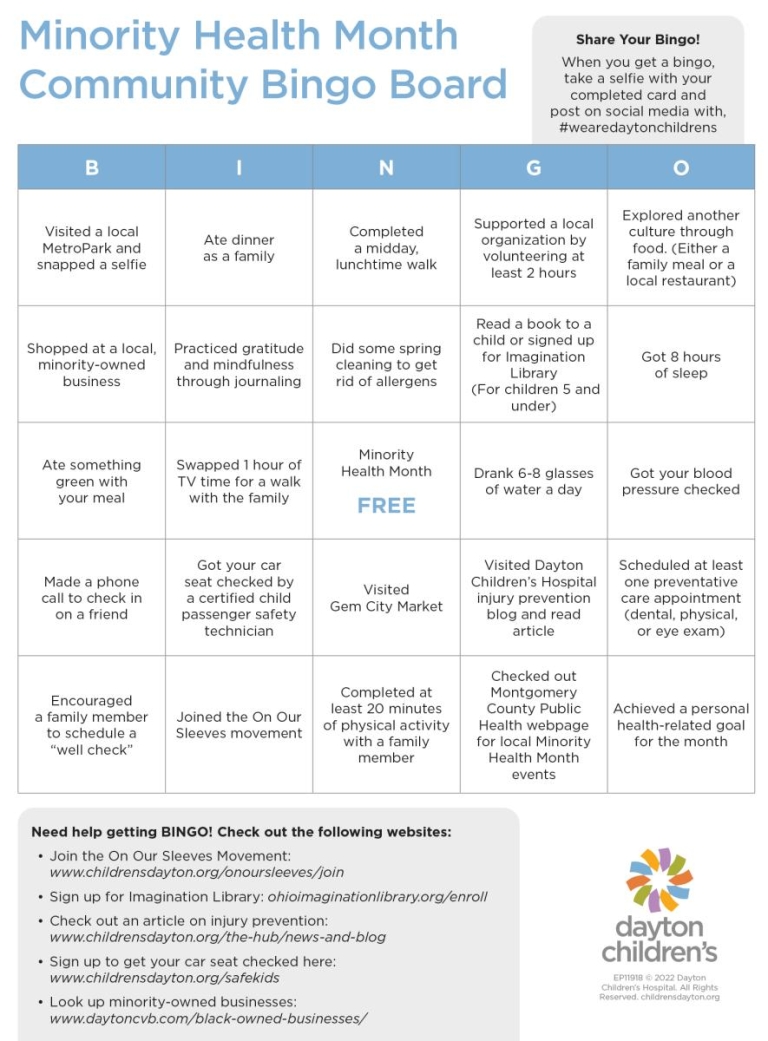4/13/22 blog post
ways to recognize minority health month in April
big and small ways we can all make a difference

Why is Minority Health Month important?
A person’s health and wellness is not just about genetics and healthy lifestyle choices. Actually, most of a person’s health is accounted for by things like where a person lives, where they play, where they work, social programs they engage with, and how they look. These factors are called social determinants of health.
This is the reason that there are so many differences in people’s health outcomes.
In the US, there are significant racial/ethnic disparities in health outcomes. People of color in the United States compared to White Americans…
- Have higher rates of chronic disease
- Are more likely to have more than one chronic disease
- Are at a higher risk for death
- Are hospitalized more frequently
These disparities are even present when all other factors are equal. So, if you take away the impact of poverty, and education people of color will continue to have worse health outcomes than white Americans.
This illustrates why Minority Health month is important!
Why do health disparities exist?
To put it briefly, health disparities exist due to underlying systemic health inequality/inequity. These inequities are within large systems, policies, and services.
Here’s one example to illustrate how many different things can contribute to racial health disparities with obesity. (Please note, this example doesn’t include everything that goes into obesity rates, but it highlights the complex nature of health disparities.)
- Due to historical events and unfair policies, supermarket companies have focused on where they service some areas while ignoring other areas.
- These practices created food deserts, which are geographic areas where residents have few or no convenient options for affordable and healthy foods. Research has shown that food deserts disproportionately impact racial/ethnic minority communities.
- A resident in a food desert is likely to have limited options for food, limited access to fresh fruits and vegetables must travel longer distances to get groceries and may pay higher prices for food. In contrast, convenience and fast-food places are usually more readily in food deserts.
- The lack of access has contributed to more diet-related diseases, like higher rates of obesity, in people of color.
Learn about food deserts here.
Why celebrate Minority Health Month?
Awareness:
One goal is to “build awareness about the disproportionate burden of premature death and illness in people from racial and ethnic minority groups.” We want people to think further than the individual or family unit, and explore all the other factors that may impact health. The awareness allows us to fully embody the value of “equity.”
Action:
The next goal is to “eliminate the strain of premature death and illness in minority populations.” We need both big picture and person-to-person actions.
Big Picture Actions:
- Advocate for policy changes to ensure everyone has the opportunity to reach their full potential.
- Hold institutions accountable for eliminating health disparities.
- Learn more about equity initiatives and participate in them.
Person to Person Actions:
- Explore your own biases and work to manage them.
- Learn about the complex nature of disparities.
- Share information about Minority Health month on your social media accounts to increase awareness.
Free family activity for Minority Health Month
Dayton Children's Center for Health Equity has put together a fun BINGO Board to encourage raising awareness and participation in Minority Health Month. Download the BINGO Board and use the hashtag #wearedaytonchildrens to show how you and your family are doing your part around town.

Where to go for more resources?
Learn more about health disparities and Minority Health Month
https://www.nimhd.nih.gov/programs/edu-training/nmhm/
https://www.nmqf.org/national-minority-health-month
https://www.acf.hhs.gov/equity
Learn about food deserts:
Learn about redlining in Dayton

